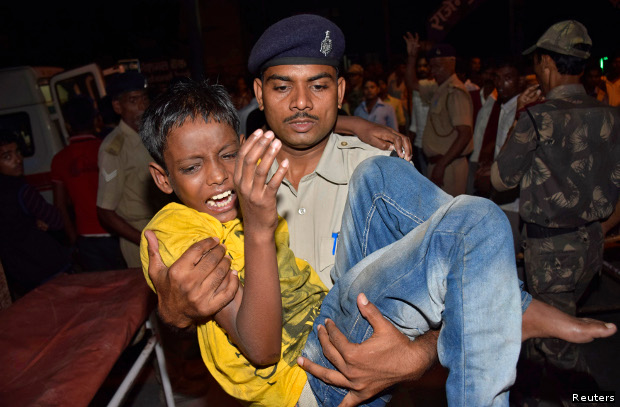Crimes Against Bihar's Vulnerable Communities Soar
Image used for illustrative purposes only.
An inadequate police force is struggling to cope with a rising crime graph against Bihar's vulnerable communities.
Bihar has seen a 20-fold increase in crime against children--from 115 in 2005 to 2255 in 2014--over the past 10 years, according to data released by National Crime Records Bureau.
Yet, Bihar has one of the lowest crime rates against children in India at five per 100,000 children, compared to the national average of 20.1, indicating that reporting may be rising but many crimes may still not be registered.
The total number of crimes against women has more than doubled between 2005 and 2014. Cruelty by husband/relatives, along with kidnapping and abduction, form the major chunk of crimes against women in absolute terms.
Source: NCRB 1, 2; Note: 2014 crime rate was calculated by NCRB against female population alone while 2005 crime rate was calculated against the whole population, so the 2005 rate was multiplied by 2 to allow for comparison.
Bihar also has topped the crime rate in dowry deaths for 2014.
There has also been a four-fold increase in crimes against scheduled castes (SCs) during the same period. The crime rate against scheduled castes (SCs) in Bihar is more than double the national average.
Bihar reported one of the highest crime rates against SCs in 2014, only behind Goa, Rajasthan and Andhra Pradesh.
A limited police force struggles to cope
The sanctioned civil police per lakh people in Bihar is 84.5, the second lowest among all the states. Only Odisha has a lower figure.
The actual strength, however, is much lower at 54.8 in Bihar, which is almost half of the national average of 109.35.
Source: NCRB 1, 2; Note: Figures as on April 1, 2014
At the same time, the sanctioned civil police per 100 sq km of area is 91 compared to the national average of 58. However, the actual civil police per 100 sq km area is only 58.7 compared to the national average of 42.6.
Bihar’s police force is also bottom heavy with a low teeth-to-tail ratio. (Teeth-to-tail ratio is the ratio of police officers from the rank of assistant sub-inspector and above to head constables and constables).
Only Odisha and West Bengal have lower teeth-to tail ratios.
Low community representation in Bihar police
When it comes to representation of different communities within the police force, Bihar falls short in all categories.
Source: Bureau of Police Research and Development; Note: Figures as on Jan 1, 2014
The percentage of SCs to the total police workforce is 10.3% compared to reservation provided of 16%. Only Chattisgarh, Haryana and Uttar Pradesh have a larger deviation between filled and reserved workforce personnel.
The percentage of other backward castes (OBCs) to total workforce is 22.1%, compared with a reservation of 33%. Goa, Gujarat, Haryana and Tamil Nadu are the only states that fare worse than Bihar in filling up reserved posts for OBCs.
In addition to the mandated outposts, Bihar has special purpose police stations–40 to deal with crime against SCs / STs and 44 to deal with crime against children.
There exists some bias in law and order cases since they are dependent on reporting. There can, however, be no doubt that the number of reported cases against vulnerable communities have gone up.
Might this show up at the elections?
(Kiran is Research Lead at Swaniti Initiative, a non-profit that delivers development solutions.)
“Liked this story? IndiaSpend.org is a non-profit, and we depend on readers like you to drive our public-interest journalism efforts. Donate Rs 500; Rs 1,000, Rs 2,000.”



